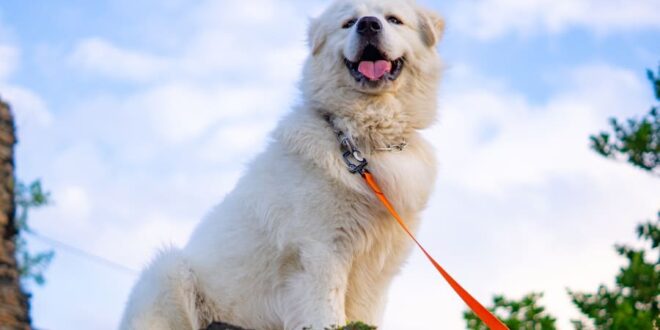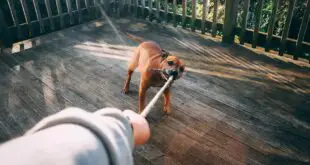As an aspiring pet owner, you might be interested in the breed, so has a Great Pyrenees ever killed a human?
The Great Pyrenees is a popular dog breed in Europe and the US, but there is a significant deficit of information about them and their behaviour.
So can these dogs become vicious? Have they been involved in any attacks that had human fatalities?
How can you prevent the dog from attacking you or your loved ones? This article will give you answers to these questions and more, so let’s get into the details;
Has A Great Pyrenees Ever Killed A Human?
Great Pyrenees are calm dogs that rarely attack humans, but they can become aggressive and kill humans if provoked. In March of 2022, a Great Pyrenees-Bulldog mix attacked and killed a girl and severely wounded her great-grandmother.
Great Pyrenees attacks are very rare, and most incidences are of abused dogs or half breeds with a more viscous breed like bulldogs or pit bulls.
What Are The Main Reasons Why Great Pyrenees Attack People?
Understanding the causes of aggression in dogs is crucial to preventing attacks. The great Pyrenees are super friendly but will attack if you provoke them. Here are some reasons that commonly lead to aggression in Great Pyrenees dogs;
- Territorial instincts. Due to their background as livestock keepers, Great Pyrenees have a strong territorial instinct. They may view strangers or animals as threats to their territory and react aggressively to protect it.
- Protective Nature. When they believe their family members or belongings are in danger, their protective Nature might lead to aggressiveness. Aggression toward perceived threats, whether genuine or imagined, may result in an attack that could become fatal.
- Fear and anxiety. Fearful or anxious dogs may resort to aggressiveness to defend themselves. If a Great Pyrenees feels confined or endangered, they may react aggressively to protect themselves.
- Inadequate socialization. Lack of socialization during a puppy’s growth stage can lead to fear and mistrust of new people, animals, or situations. Because of their lack of exposure, they may react aggressively when confronted with new objects.
- Resource guarding. Dogs can become aggressive if they believe their resources, such as food, toys, or even resting places, are under threat or being taken away. This defensive conduct has the potential to escalate into aggressiveness.
- Miscommunication or provocation. Dogs may interpret some activities from humans or other dogs as threats or aggressiveness, resulting in a protective response.
Unintentional provocation, such as unexpected movements or intense eye contact, can cause hostility.
- Health or pain issues. Dogs in pain or discomfort due to medical concerns may react aggressively. It’s their way of saying they’re not feeling well and want to avoid extra discomfort.
What Are The Best Parts of A Great Pyrenees?
The Great Pyrenees is a famous dog in the US, and many distinguishing features have made it so popular. Let us review some of the defining aspects of the Great Pyrenees to see if it is an ideal dog breed for you;
1. Large and robust build. The Great Pyrenees is a huge and strong breed famous for its size and strength.
Adult males are approximately 27 to 32 inches tall at the shoulder and weigh 100 to 160 pounds, whilst females are slightly smaller. Their bulk was historically necessary for guarding and defending livestock from predators.
2. Peaceful and protective Nature. Despite their intimidating size, the Great Pyrenees are known for being friendly and protective. They are recognized for forming close ties with their family and are incredibly gentle with youngsters and smaller pets.
This protective impulse stems from their previous experience as livestock guardians, where they had to be vigilant and compassionate to the animals under their care.
3. Loyal and devoted companions. The great Pyrenees are highly dedicated to their families. They thrive on human interaction and frequently form strong bonds with their owners.
Because of their loyalty, they are fantastic friends, constantly willing to be by their family’s side, bringing comfort and companionship.
4. Instincts of a natural guardian. The great Pyrenees were bred as livestock protectors and had a strong instinct to protect their area and loved ones. They are vigilant and attentive, frequently patrolling their surroundings to protect their family and possessions.
5. Adaptable to different environments: The Great Pyrenees have an adaptable character that allows them to live in various environments. They have traditionally thrived in rural settings as livestock guardians.
They may quickly adapt to suburban or urban situations if given adequate exercise, mental stimulation, and companionship. Their calm Nature and versatility make them appropriate for a variety of households.
6. Weatherproof coat. Their double coat protects them from cold temperatures and adverse weather conditions. Their outside coat is coarse and lengthy, with a soft and thick inside coat.
This coat allows them to stay comfortable in various climates, making them ideal for colder climates.
7. Independent thinkers and problem solvers. Great Pyrenees are clever canines with independent thought and problem-solving abilities.
While this characteristic might make training more difficult, they can also assess events and make decisions when guarding or protecting their environment.
They can learn to make acceptable decisions while obeying directions with patience and consistent teaching.
Relationships Between The Great Pyrenees And Children
Most people researching dog aggressiveness are worried about their kids’ safety around the dog. So how do the Great Pyrenees relate to children?
You can create a safe environment for your kids with a Great Pyrenees in the house by considering the following;
1. Socialization. Any dog, especially one that will interact with children, requires proper socialization.
Early socialization with various individuals, including children, new locations and positive experiences will assist a Great Pyrenees grow comfortable and well-adjusted among kids.
2. Supervision. While the Great Pyrenees are generally friendly dogs, they are large canines with strong defensive instincts. Close supervision is required when they engage with children to protect the safety of both the dog and the child.
3. Size. Even with the best intentions, Great Pyrenees may accidentally knock over tiny children due to their large stature. Accidental injuries can be avoided by carefully managing their interactions.
4. Training. Basic obedience training ensures that a Great Pyrenees understands and follows commands. This helps them manage their behaviour with youngsters and guarantees everyone is in a good and safe environment.
5. Temperament. While most Great Pyrenees are nice with children, individual dogs’ temperaments might differ. Some dogs are more patient and tolerant, whilst others are more reserved or distrustful.
6. Child Behavior. It is critical to teach children how to interact responsibly with dogs. This includes not pestering a dog while eating or resting and interpreting body language to avoid unintentional provocation.
7. Consistency. Training, regulations, and routines must be consistent for the dog and the youngster. A well-behaved and well-adjusted dog is more likely to interact positively with children.
Tips For Proper care Of A Great Pyrenees
The best trick to having a safe and well-behaved dog is to take proper care of them. Great Pyrenees are amazing dogs, and they can be the best companions if you treat them well and form a bond with them. Here are some of the best tips on caring for your Great Pyrenees;
- Regular exercise and mental stimulation. While the Great Pyrenees are known for their cool demeanour, they still require regular exercise to stay healthy and mentally stimulated. Daily walks, play, and even short treks can help keep them entertained and healthy.
- Grooming routine. You must groom them regularly to keep their double coat healthy and manageable. Brush their coat at least once a week to avoid matting and to remove loose hair.
They lose more hair in the shedding seasons, so you must brush them more regularly to keep your house clean.
- Nutritious diet. Feed your Great Pyrenees a nutritious meal appropriate for their age, size, and activity level. Consult your veterinarian about the proper portion sizes and diet kinds to maintain a healthy weight.
- Routine veterinary care. Schedule regular vet visits to monitor your dog’s health and handle any concerns. Maintain their overall health by keeping up with immunizations, parasite prevention, and dental treatment.
- Living room. Although the Great Pyrenees are versatile, they do best in homes with enough room. They appreciate having space to run around and explore, so consider giving them a fenced-in yard to play and patrol.
With proper exercise and attention, apartment life can work, but a house with a yard is best.
- Protection from harsh weather. Their weather-resistant garment protects them from chilly temperatures and provides refuge during severe weather.
Heat can be hazardous, so make sure they have access to shade, fresh water, and a cool environment when it’s hot.
Conclusion
If you wondered if a Great Pyrenees ever killed a human, you have all the information. The latest incident was in 2022, involving a mix with a pit bull. Purebred Great Pyrenees are generally friendly, and they will rarely attack unless they are provoked or unwell.
You must give your dog proper training and a nurturing environment to ensure they don’t become aggressive. Introduce them to new people, places, sounds, and experiences at a young age to help them grow into well-adjusted, confident canines.
 Being Human
Being Human





